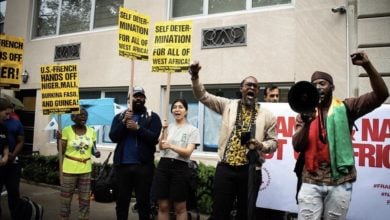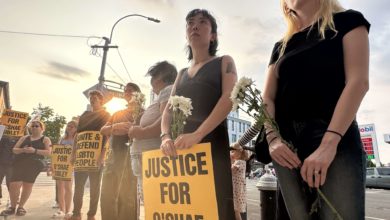Today, anti-war, LGBTQ and anti-imperialist activists everywhere are celebrating the release of two U.S. political prisoners: Puerto Rican independence fighter Oscar López Rivera and whistleblower Chelsea Elizabeth Manning. Both heroes, whose sentences had been long and fraught with torture, have pledged to continue the fight against abuse, war and U.S. hegemony.
¡Que Viva Puerto Rico Libre!
Oscar López Rivera, age 74, spent nearly 37 years in prison — 12 of which were spent in solitary confinement. He is one of the longest-imprisoned political prisoners in the world. He was imprisoned for Puerto Rican liberation activism in the U.S. Because of the length and severity of his sentence and treatment, in 2015, Venezuelan president Nicolas Maduro even offered a prisoner swap, proposing the release of U.S. -backed ultra right-wing opposition leader Leopoldo Lopez in exchange for López Rivera’s freedom.
López Rivera was born in San Sebastian, Puerto Rico, but moved to Chicago at a young age with his family. He became a community leader in Chicago, organizing around health care, education, unemployment and campaigns to free political prisoners. He helped found the Rafael Cancel Miranda High School (now the Dr. Pedro Albizu Campos High School), a specialized halfway house for people struggling with substance abuse.
As a member of the Puerto Rican Marxist-Leninist organization Las Fuerzas Armadas de la Liberacion Nacional — FALN (Armed Forces of National Liberation, FALN), Oscar López Rivera became very active in the struggle for Puerto Rican independence inside the belly of the beast. In 1975, his organization was forced underground due to extreme persecution by the U.S. government. Five years later, in 1981, the FBI captured López Rivera and his comrades. López Rivera was sentenced to 55 years for many charges, including seditious conspiracy.
López Rivera has always been and continues to be a principled and inspirational leader in the fight for freedom from U.S. colonialism. In 1999, he was offered clemency by the Clinton administration, but turned it down because it was not extended to his comrades. Today, he promises to continue the
struggle for Puerto Rican liberation — and also to stand in solidarity with other movements.
He states:
“I want to explain why I am wearing black today. First, because during the years I was in prison, I was never able to dress in mourning when loved ones died. Second, because it is the International Day Against Homophobia and Transphobia, and I want to express my solidarity with that community.
“Third, I want to express my solidarity with the Black Lives Matter movement. Fourth, because my message is, and it will be, one of love, not of hatred or fear.
“Fifth, I want to express my solidarity to all political prisoners in U.S. jails, and with Ana Belen Montes.
Sixth, I want to express my solidarity with the students at the University of Puerto Rico.“I say: Long live the students, long live the LGBTTIQ community, long live the struggle for a better and more just world! Long live Puerto Rico of love and liberty! In resistance and struggle always.”
Fight the war machine, fight for trans liberation!
Chelsea Elizabeth Manning, a former U.S. Army soldier and a heroic whistleblower, was freed after seven years in a military prison. Manning joined the army in 2007 and was deployed to Iraq in 2009, where she became aware of a series of U.S. war crimes and abuses. She exposed, through Wikileaks, the use of torture by the U.S. Army, deliberate murders of civilians and the innocence of most Guantanamo detainees. She was convicted of violating the Espionage Act, the Computer Fraud and Abuse act and counts of stealing government property in 2013 and was sentenced to 35 years.
In August of that year, the day after her sentencing, Chelsea Manning came out publicly as a trans woman. She faced double the abuse as a result, targeted both by transphobes and by people who villainized her for her whistleblowing. During her time in prison, Manning was bombarded with arbitrary infractions — ranging from threats of solitary confinement for possessing an expired tube of toothpaste to charges of disorderly conduct for accidentally knocking a condiment packet off a table. Manning was consistently denied communication with her lawyer, as well as access to basic medical care and gender-affirming treatment. In September of 2016, Manning began a hunger strike to demand appropriate treatment for herself and other trans prisoners. The ongoing abuse she endured even resulted in suicide attempts.
Today, Manning is excited to be free and continue to be active in the community. “Whatever is ahead of me is far more important than the past,” she says. Her lawyer, powerful and dedicated trans rights fighter Chase Strangio, promises that while Manning needs to heal from the lasting effects of her seven years in prison, “She will remain and emerge an even stronger advocate for trans justice, government transparency and the core principles of democracy”.
Movements win justice!
Many people attribute this victory to the benevolence of the Obama Administration. But by thanking Obama or the Democrats — who were involved in the imprisonment of Chelsea Manning and continue to be some of the staunchest opposers of freedom for political prisoners — we sell ourselves short.
It is not politicians that give us justice, but movements. The ongoing years of demands of justice for Oscar López Rivera demonstrated not only unity within the Puerto Rican community, but an ability for multiple communities to come together and mobilize on a common ground. The movement demanding Chelsea Manning’s freedom united anti-war organizers, LGBTQ rights fighters and activists against government spying and secrecy. It is thanks to that unity that the war machine, U.S. colonialism and its figureheads in the White House were pushed to act.
Today, we celebrate the release of two heroes — but also the victory of united movements by people in the streets. Those victories are not contingent upon who is in office — they depend on how dedicated and united communities are in the fightback against injustice.
While we celebrate the release of Chelsea Manning and Oscar López Rivera, we must turn our efforts to those who remain in US jails. Leonard Peltier, Mumia Abu-Jamal, Mutulu Shakur, Russell Maroon Shoatz and so many others remain languishing as political prisoners without justice.
Under the current system, within the entire prison-industrial complex, almost anyone who is imprisoned can be viewed as a sort of political prisoner. It is a political act to target marginalized communities for daring to survive by engaging in underground economies. It is a political act to unleash police abuse on people of color while protecting the comforts and profits of the wealthy. It is a political act to intimidate activists and organizers. We need to mobilize for all political prisoners — and for a new system to make sure no one is imprisoned for fighting for justice ever again.






